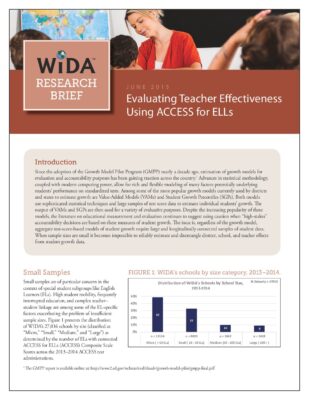Resource Hub
Explore guides, research papers, policy briefs, and tools to aid decisions on standards and assessments.
Evaluating ELL Teacher Effectiveness Using Value-Added Models and ACCESS for ELLs
Based on methodological and data-related issues, the research community cautions against heavy reliance on student test scores for high-stakes decisions. For example, the Board on Testing and Assessment of the National Research Council of the National Academy of Sciences states that “VAM estimates of teacher effectiveness should not be used to make operational decisions because such estimates are far too unstable to be considered fair or reliable.” A review of VAM research from the Educational Testing Service’s Policy Information Center similarly concluded, “VAM results should not serve as the sole or principal basis for making consequential decisions about teachers. There are many pitfalls to making causal attributions of teacher effectiveness on the basis of the kinds of data available from typical school districts.” Finally, the RAND Corporation reports that “the research base is currently insufficient to support the use of VAMs for high-stakes decisions about individual teachers or schools.” If state policy requires the use of ACCESS for ELLs test scores for teacher accountability, the proportion that such scores be used should be small (e.g., teacher observations, portfolios of student work).
This research brief can be found in the Briefs section under Research.


The brief provides a clear, simple summary of the key issues. It could be improved by providing supporting evidence indicating how those conclusions were met. The brief is very concisely written. However, more details/visuals would be nice so that the reader can think about how he/she might apply the ideas to his/her own situation. This is a useful resource for state and local educators — and timely too. See previous comments around its brevity.